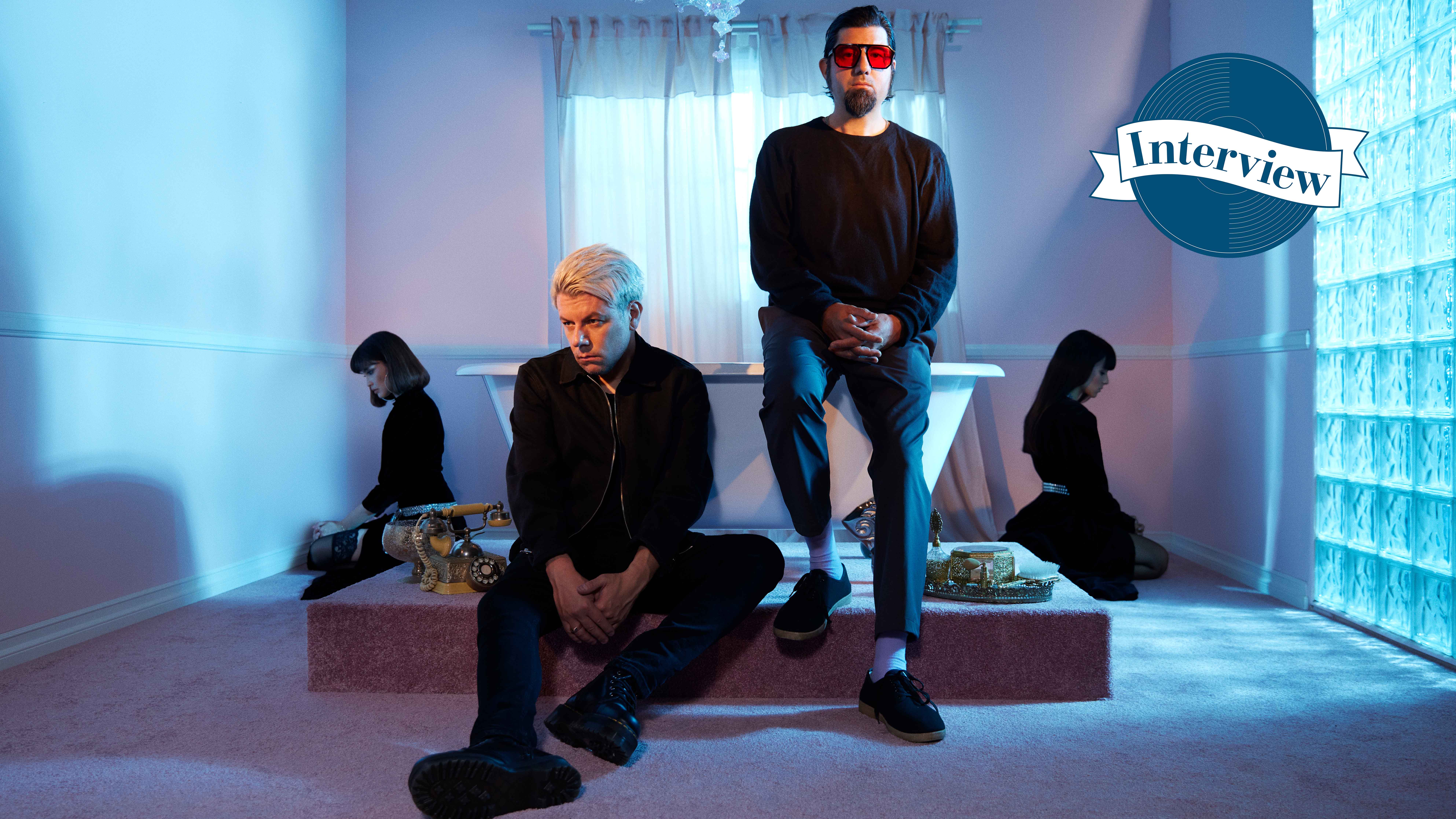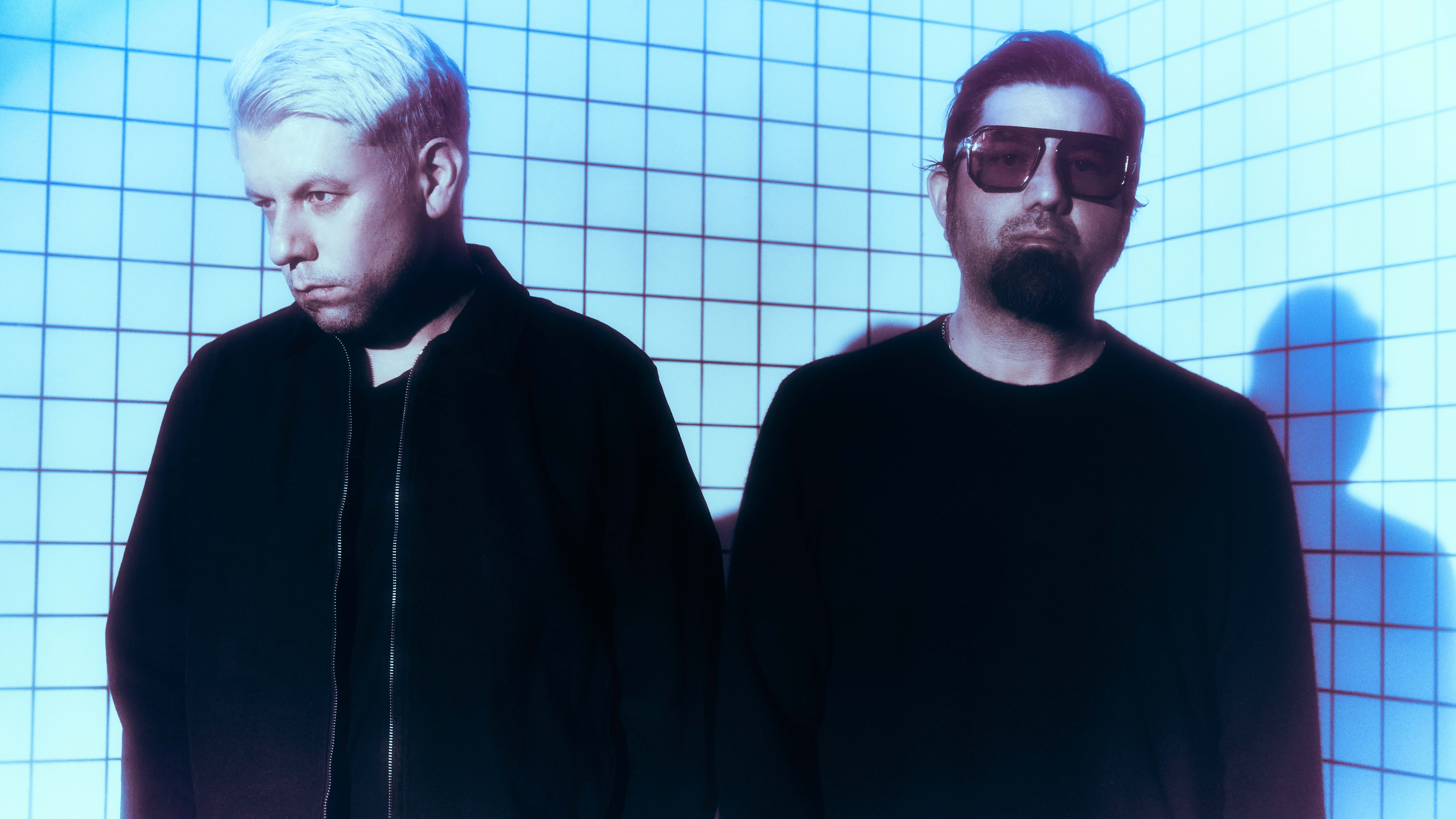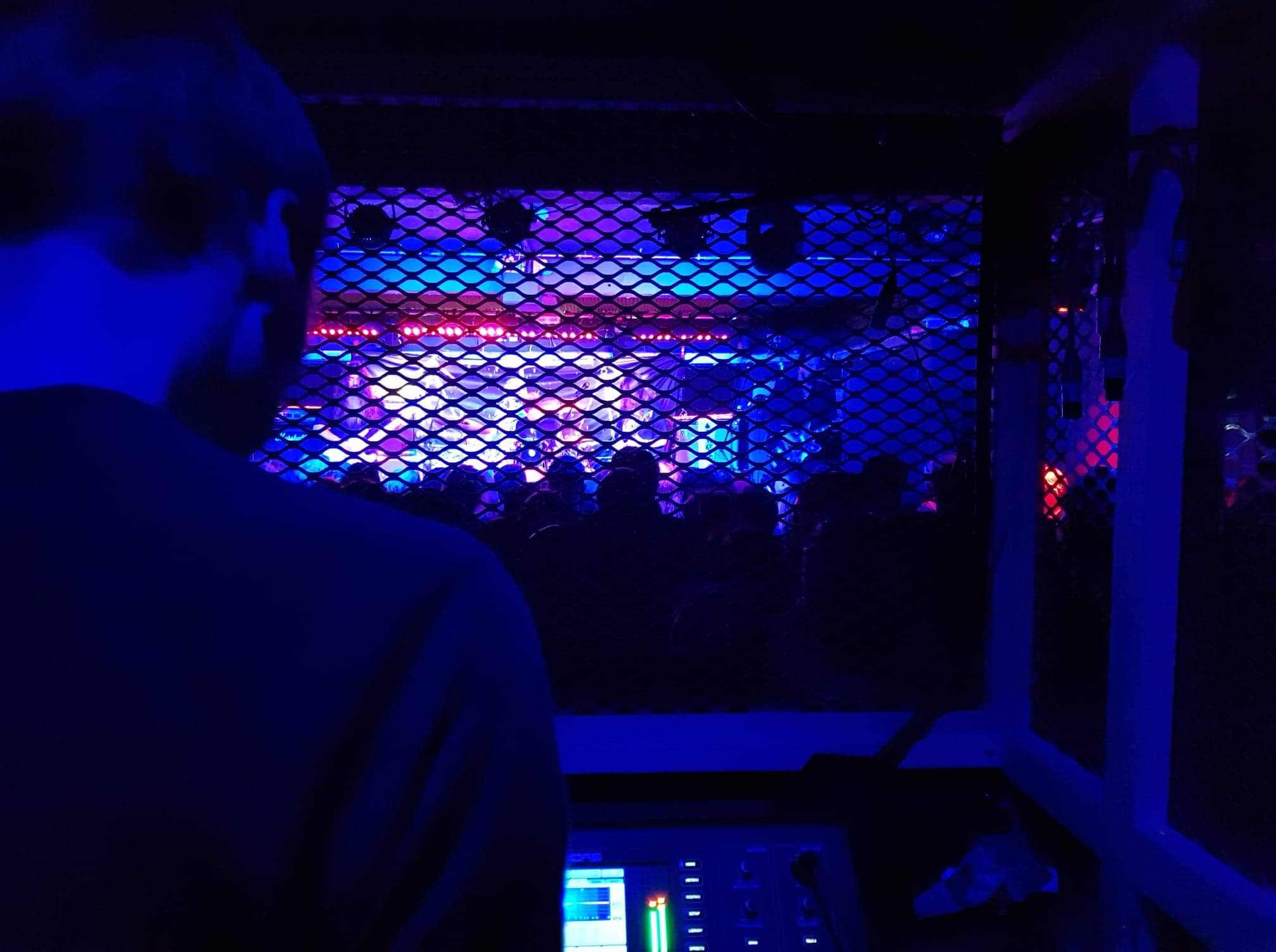"As producers, you struggle to get inspired if you're using the same thing. A lot of times, a piece of analogue gear can break you out of that rut" – Shaun Lopez on crafting synth sounds for the long-awaited second album from Crosses
"I think there's just so much more you can do on a piano or a synth with voicing and stuff like that, which you can't do on guitar"

Nearly a decade after their debut full length, the synth-heavy darkwave inspired duo Crosses are back with their sophomore record - Goodnight, God Bless, I Love U, Delete. Made up of Deftones frontman Chino Moreno and former Far guitarist Shaun Lopez, the pair have a longstanding friendship and a tight musical chemistry, which brings an air of levity to the music they create together. Even at its most pounding and distorted, there's still a sense of allure and fun.
Shaun's early work as as founding guitarist for the iconic Sacramento band Far helped to define a genre, but in more recent years he has become known for his production work. With the new Crosses album, his evolution as an artist led him even deeper into the world of synths and electronic production. We spoke with Shaun from his studio, where he guided us through the gear and equipment used to make the album's most notable and unique sounds.
When working on the songs for this album, what would the starting point generally look like? Was it different for every song or is there a particular piece of gear or instrument that you used which would act as a building block for everything else?
"It's definitely different for each song. Novation make a synth called Peak, and the first song on the album, Pleasure, uses the Peak. I plugged it in and used my Arturia Keystep to start tweaking this bass sound in there. I made this little sequence using the Keystep and thought it was pretty cool. I didn't feel like I was in a box, it wasn't a soft synth, it was just all analogue. Sometimes when that happens, I will forget to record it and then move something and that will cause something in the sequence to change. It's kind of like working with Eurorack modular systems – you should always be recording! Luckily I was recording, so I just locked down that main loop.
I'm a fan of rare synths from the '90s
"The next time Chino was in town, we were going through my folder of loops and starter ideas to see if anything clicked. I played him that one, and his reaction was 'What's that?!' Usually when he says that, that means he wants to go into the vocal booth right away and just lay down the first thing that comes to his mind. Basically, the opening line of that song, at least melodically, was the first thing he sang. Later on he wrote lyrics to that, but the initial melody stayed the same. It was a track that he was really digging to the point where it wasn't even finished yet and he had already decided that he wanted it to be the opening song on the album. That definitely gave me pressure to finish it, because I didn't even have drums on it or anything. Sometimes that pressure is good, because you know you have to get it done. If there's no due date or anything, then it's easy to just let it be.
"I'm a fan of rare synths from the '90s, and there's a synth called E-MU Orbit, which is a rackmount thing. So many of the sounds in there are instantly recognisable. You'll hear sounds and tones and it'll instantly bring to mind artists like The Prodigy and The Chemical Brothers. It just has this classic '90s feel, and there's also a bunch of one-shot sounds in there. Some of them are just funny, because it'll be weird vocalisations and noises. There's one sound in there which is what became the opening sound of the song Invisible Hand. Again, I sequenced that on the Keystep and played with the pitch on it and stuff. As soon as I heard that, I knew that was going to be something interesting."
It feels more like guitar is used to support the songs the songs and add texture, rather than leading them. Was that a conscious decision?
Want all the hottest music and gear news, reviews, deals, features and more, direct to your inbox? Sign up here.
Some songs don't even have guitar on them at all, which is very unusual for me
"No, it actually wasn't and I didn't even realise just how little guitar there was until we were mixing the album. Some songs don't even have guitar on them at all, which is very unusual for me. I'm figuring out the live set right now, and there's some songs where I'm not going to have a guitar strapped around me at all which is a very strange feeling, as I've always had that.
"I really only started playing Piano about 9 or 10 years ago. I think because of that, piano and synth is just much more inspiring to me right now creatively. I think there's just so much more you can do on a piano or a synth with voicing and stuff like that, which you can't do on guitar. It sometimes even gets to the point where I'll sample my guitar just to be able to play it on keys, because it'll give me an idea and make me write something I wouldn't normally think to do.
"I love the guitar, but when I play it so much it just starts to be a bit less inspiring. Sometimes a new instrument or even a new piece of gear can just really inspire you in a new way."
There's also something nice about hearing something on a record and wondering how they did it – And when it's an instrument you're not familiar with, it becomes exciting and a challenge.
"Yeah, that kind of stuff will drive me crazy sometimes! I get sound envy, because most sounds I hear in music these days, I don't have much of a problem identifying – I can probably work it out. But occasionally you'll hear a sound and have no idea how it was created, and then you'll end up down a YouTube rabbit hole trying to figure out how it was done."

The guitar tones on this album were done with the Fractal Axe-FX. Could talk a bit about your journey from amps to modelling?
The way technology has evolved over the last five to 10 years is impressive enough with synths, but the way the guitar side of things has progressed is just insane
"It's definitely different. The way technology has evolved over the last five to 10 years is impressive enough with synths, but the way the guitar side of things has progressed is just insane. I still have real amps, and I still love them, but man, Axe-FX is just crazy.
"It has every cabinet and every speaker model you could want integrated. You can move the mic placement around and decide how close it is to the speaker, how much splashback you want from the wall, and it all sounds insanely good. And it's just easier, too, from a producing standpoint. There's a bit of a learning curve to learn how to use it, but once you do, it's insane how good it is."
So it's not an aesthetic choice to use Axe-FX, it's because you find it to be superior?
"I mean, I can do a lot of the stuff that I can do with Axe-FX, but it would take me a lot longer. The workflow is just much better. I still use a lot of pedals, though – I'm not 100% Axe-FX yet. There's always some pedal involved which would do a slightly different thing than what the pedal models would do."
One of my favourite songs on the album is Big Youth, and I was really struck by the heaviness of it despite there being virtually no guitars. How do you achieve heaviness through synths?
"There is actually a little bit of guitar in there, but it's mainly just me doing some palm-muted stabs and hitting harmonics and stuff, but that's really the only guitar in it. There's bass guitar in there, but the driving sort of 808 sound was my Roland TR-8S plugged into an overdrive pedal. That's what I love about that song, the beat is so driving and sounds really thick.
If you have a ton of guitar tracks in there, that's going to end up battling for space with your hi-hats and your snares, and anything in the upper-frequency range
"The main verse sound is my Prophet 6 synth, and the weird screechy synth thing you hear is a Roland Cloud System-8. That's the crazy thing about that song, there's not a lot of tracks. As a mixer and producer, that makes songs a lot easier to mix too. More tracks means more frequency landscapes that you are taking up – so if you have a ton of guitar tracks in there, that's going to end up battling for space with your hi-hats and your snares, and anything in the upper-frequency range. So it's definitely one of my favourites on there."
During the song Found, there's what sounds like some Edge-esque delay guitar which sits very delicately in the mix. Did I identify that right?
"Kinda! I wouldn't say I'm influenced by The Edge very much at all really, but that spacial guitar sound is something I would attribute more to a band like Failure. I have an electric 12-string guitar which I used for that part, and is why a lot of those higher notes cut through the way they do. There are some pitching effects on there too, but it mostly all comes from that electric 12 string."
Near the end of the song Ghost Ride, there is a part where the synthesized bass really locks in with the kick drum and the combination of sounds has this distorted impact. Could you talk a little bit about how you did that?
"That's one of maybe three songs on the album which I shared production duties with another person, which is kind of a new thing with Crosses. Outside of Crosses, I collaborate with so many different people and I've learned that there is such a strength in that. That song was co-produced by a producer called Away, and it was all 100% in the box, inside Ableton. There's a synth called Vital which we used, and another soft synth called Serum. There's a distortion plugin by Minimal Audio called Rift, and I use that a ton in that song.
We have access to everything now, as musicians and artists – you can just have a laptop and a wifi connection and you've got a whole creative world at your disposa
"Sometimes producers will try and gatekeep what they use, and to a certain extent I think you should probably leave a little bit of mystery – but you could hand somebody the paintbrush and paints of a famous artist and they're not necessarily going to come up with something which looks the same as that painter's style. They're going to do their own thing and apply it in a totally different way. Having the tools is only one part of it, you know? I think that's the beauty of it. We have access to everything now, as musicians and artists – you can just have a laptop and a wifi connection and you've got a whole creative world at your disposal. But the question is what are you going to do with it? You can make something amazing, but you're going to need to tweak it. You gotta own it."
You mentioned Ableton – was that the main DAW that you used for this album?
"Yeah, I love Ableton. I love it so much that when people don't use it, I'm like... Really? [laughs]. I use Pro Tools still to track vocals, because in that sense it is superior, but overall I love Ableton and would use that any day."
Do you tend to use your DAW as more of a tape recorder, so to speak? Or is it important for the sequencing and timecoding of your music?
"I think the flexibility of a DAW is important for sure. You can do things much faster in Ableton, apart from record vocals – which is why I have both Ableton and Pro Tools. I was working with another producer and Ableton was the only DAW he had ever used, and I was just watching him work and seeing how fast and efficient he was. Stuff that would take me so much longer to do, he was doing in a matter of moments. I knew I had to learn Ableton after that. It's a learning curve for sure."
In the gear list for this album there's a lot of interesting stuff on there – I'm definitely enamoured by the Roland Space Echo. Could you talk about how you used that?
"That was all over the EP we made last year – Permanent Radiant. I specifically remember putting it all over the drums of the song Procession. Those drums are all run through there. From the new album, the song Girls Float, Boys Cry (featuring Robert Smith of The Cure) and we did the same thing. The drums are layered and there's a bit of space echo in with those layers. The acoustic drums that come in towards the end of Grace as well also have that.
"A lot of times with the Space Echo, I'm almost just wanting it to hit some sort of tape to get it a bit crispy, so sometimes I'll just have the delay on it as almost like a quick slap but with not a lot of feedback on it. So it's there to make it crunchy rather than doused in reverb."
As both a musician and a producer, is it important for you to strike a balance between analogue and digital elements, or is it more of a case of whatever facilitates the song?
"It is and it isn't. I have all this stuff in here, but if I were giving advice to someone who was just starting, I'd say that you don't need all of this to make great music or art. Part of the reason I have all this stuff is because sometimes, as producers, you struggle to get inspired if you're using the same thing repeatedly. A lot of times, a piece of analogue gear can break you out of that rut. Sure, you could theoretically make the same thing in Ableton, but you wouldn't – because the feeling of clicking a mouse and looking at the screen is just different.
This TR-8 right here, the stuff I make on this I would never make on Ableton
"This TR-8 right here, the stuff I make on this I would never make on Ableton. I'm plugging this through pedals, I have different overdrive pedals with different gain staging and each one acts different to the same sound that is coming out of this. You'd think they'd all act in the same way because they're all overdrive pedals, but there's just something that it does which means it sounds different every time. Just a simple 808 beat with the pedal engaged will sound so good. You don't necessarily need it, but it is important for someone like me."
In the video for Invisible Hand, you look almost like something of a DJ at the back behind Chino - Is that the way Crosses intends to perform live going forwards too, as a duo, or do you think you'll put together a live band again?
"For these upcoming shows it will just be the two of us, as you see in the videos. Eventually I would like to have our guys back up there. For now, it just felt right to do it like this. It does somewhat feel like I am a DJ back there – But it's definitely challenging. I'm doing a lot of things at once, and not just trying to hit space bar."
- Crosses tour the US and Canada in February and March 2024. More info at crossesmusic.com. Goodnight, God Bless, I Love U, Delete is out now on Warner.
Sam Drower is a sound engineer, musician and all-around music junkie based in Bristol, UK. He began contributing to MusicRadar in 2020, when the global pandemic brought live music to a screeching halt. When not behind the mixing desk for various bands, he is playing bass for blackened mathcore group Host Body.
